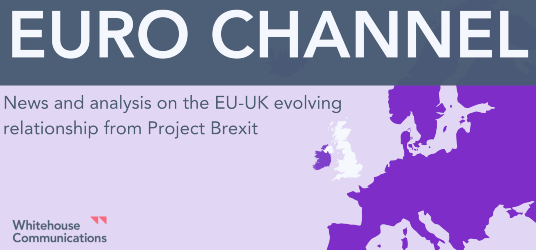In October, amid preparations for the United Nations Climate Change Conference (COP26) where world leaders are currently discussing the need to reduce carbon emissions, the UK Government turned its coal power plants back on, in the wake of an energy crisis that could see 15 million Britons hit with a £139 a year rise to their energy bills. Ofgem, the British energy regulator, raised the alarms in September when it warned that ‘a perfect storm of market forces’ would leave consumers with fewer pounds in their pockets and British energy companies facing collapse.
This is not only an issue affecting the British Isles. Across the Channel, with European citizens facing similar spikes in energy costs, the heads of the 27 EU Members States got together in Brussels to discuss common approaches to deal with rising energy costs – albeit with little success.
If you are wondering what is causing this energy crisis, how the UK’s response to rising prices differs from the EU’s, and whether Brexit has anything to do with your new energy bill, keep reading, as we delve into this week’s Euro Channel.
Why are energy prices going up?
In short, you can blame the rise in your energy bill on China, Russia, capitalism, and bad preparation. In other words, a mix of political, economic, and historical reasons lie at the core of the current energy prices.
After a cold winter during which a big chunk of the population spent a lot of time at home living under COVID-19 lockdown rules, gas supplies across the entire European continent were depleted, leaving little room to adequately respond to supply shortages and downfalls.
The same is true in China, where the reopening of the economy and global supply chains led to an exponential increase in the demand for gas across Asia. To meet this growing demand, global gas exporting countries like Qatar, Algeria or Nigeria have increased prices and re-distributed gas shipments across the world, leaving Europe, and other countries that depend on them, with a smaller supply reaching its shores.
Then comes politics. In a world where energy is a foreign policy tool, Russia was quick to seize the opportunity. Europe has long suffered from a high reliance on Russian gas – in 2018, around 40% of the EU’s natural gas imports originated in Russia – with Eastern Europe being particularly reliant on Moscow for its energy supply. In response to unprecedented demand in Europe, Gazprom – Russia’s state-backed gas company – chose not to increase exports to the continent, causing shockwaves across European nations that led to a 10% increase in gas prices on the same day as the announcement alone. Why would the Russian company dismiss the opportunity to maximise sales and revenue from European nations? The answer is Nord Stream 2. The proposed pipeline linking Russian supplies to northern Germany across the Baltic Sea would double Gazprom’s gas supplies into Europe. But with growing criticism from key partners such as the United States, that do not want to see an increased reliance on Russian energy imports in the continent, along with the fact that the project’s biggest supporter, Angela Merkel, is handing over the Reichstag to a more Russia-sceptic SPD and Green Party, Nord Stream 2 looks far from a reality. Restricting gas exports to Europe may highlight the need for new energy infrastructure between Russia and Europe, but it may also be a shot in the foot, bringing into question the EU’s plans to increase reliance on Moscow when the block seeks to promote strategic autonomy, following the Russian display of bad faith as an international partner at a time of need.
To top it all off, the UK finds itself in a particularly difficult position. For a country that relies heavily on gas for heating and cooking, the British are heavily reliant on gas imports from mainland Europe. The country has some of the lowest gas supplies – less than 1% – in the entire European continent, attributed to a lack of storage capacity. To a lack of infrastructure and shrinking energy supplies, add technical issues that have left some of the UK’s main power cables with Europe out of operation, and you find a perfect energy storm.
What has London done about it?
To ensure its 67 million inhabitants and world leaders travelling to Scotland for COP26 aren’t left in the dark, the UK Government has temporarily reactivated its high pollutant coal power stations. Demand has also been met with the use of nuclear energy, which supplies the UK with 20% of its electricity. These are however due to close by the end of the decade, with just a single nuclear power plant being built in Somerset to replace it, leaving future prospects for energy independence even frailer.
British consumers are protected from sudden price hikes in energy by Ofgem’s energy price cap, but this often adds pressure to suppliers who cannot pass on the costs of higher prices. With rising costs and struggling to meet demand, small British energy companies are facing financial problems, with some actors not surviving the crisis. For many consumers, this may mean having to switch suppliers and being put under more expensive energy plans, therefore defeating the objective of the price cap.
This has led to growing calls from industry groups to end the energy price cap to ensure the survival of the industry. The Business Secretary, Kwasi Kwarteng, has however stressed that the price cap is “Non-negotiable”, and stressed that the government does not want to be “throwing taxpayers’ money” at companies that have been badly run. While not favouring support to energy companies, the Business Secretary is listening to concerns from all British industries and businesses facing the impacts of higher energy costs, such as glass, chemicals, or electronics, having made a formal request to the Treasury for support measures.
What can Brussels do about it?
As part of the EU Single Market, the 27-Member-State bloc operates a harmonised energy market that for the past 30 years has worked to liberalise the EU energy market and drive prices down for the benefit of European citizens. While Member States are free to decide on their own energy mix, they must follow the rules and regulations agreed at the EU level. The Internal Energy Market also allows for the free movement of gas and electricity without restrictions and tariffs, and is an important tool to shift away from long-term contracts for fossil fuels, incentivising the shift to less carbon-intensive sources of energy such as gas and renewables.
Energy prices within the EU market are based on supply and demand dynamics, bringing the market’s volatility to the limelight during times of crisis. The market has worked in consumers’ favour for decades – just at the start of the pandemic in 2020, for example, the EU energy market saw negative prices for energy due to large supplies and little demand, delivering a 20% fall in the cost of gas to EU citizens. With inverted supply and demand trends, however, the market stops working in the EU’s favour, with gas prices up by more than 450%.
Faced with unprecedented prices, growing calls to overhaul the EU’s energy market and introduce insurance mechanisms to address periods of high prices have risen to the surface. Ministers from France, Spain, Romania, Greece and the Czech Republic came together to call on changes to “better establish a link between the price paid by the consumers, and the average production cost of electricity in national production mixes”, with the Commission promising to consider how this change could be introduced. Brussels doesn’t rush into decisions, however, and sweeping change to the EU’s energy market would take years of policymaking. This is an argument raised by other Member States such as Germany, the Netherlands, or the Baltics, which argue that transitory measures are the proffered course of action, as experts predict shortages will be addressed by early 2022.
While Member States debate the best approach to follow, the Commission is working to find ways to boost the EU’s capacity to produce and store natural gas, so as to be able to better respond to shortages and price hikes. Energy Commissioner Kadri Simson announced that the EU executive will propose a voluntary system for joint storage and procurement of natural gas, a tool that has the potential to ease out shortages among participating Member States during future crises.
And what about Brexit?
Great Britain left the EU Energy Market at the end of the transition period in December 2020, while Northern Ireland remains a part of the Single Electricity Market with the Republic of Ireland. This has, however, not been a damaging factor in the energy crisis. The causes for gas shortages are global and being felt across the EU and the UK alike.
Prices have risen on both sides of the Channel, but while EU Member States trade energy efficiently with each other using joint energy auctions that balance prices across the bloc and leave no Member State particularly exposed to high prices, the UK now has less leverage to address price hikes.
While Brexit has not been a defining factor in the energy crisis, planned reforms to EU energy policy may leave the bloc better prepared to address market volatility in the future when compared to the UK. Revisions of EU legislation announced as part of the bloc’s “Fit for 55 Package”, such as the review of the Renewable Energy Directive, will boost the EU’s own energy production and leave the bloc less reliant on foreign suppliers. Moreover, initiatives for the joint procurement and storage of energy among Member States will increase resilience at times of crisis.
The EU can leverage the unity and resources of its Member States to take steps to increase its resilience and vulnerability to energy shortages. Alone in the international arena, protecting British consumers from global energy crises will not be as easy for Number 10.
Political consultancy
The Whitehouse team are expert political consultants providing public relations and public affairs advice and political analysis to a wide range of clients, not only in the United Kingdom, but also across the member states of the European Union and beyond. For more information, please contact our Chair, Chris Whitehouse, at chris.whitehouse@whitehousecomms.com.

